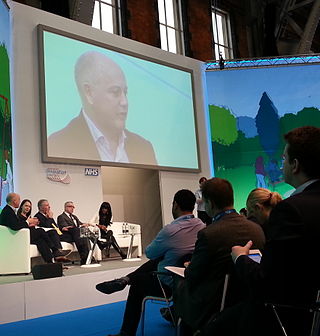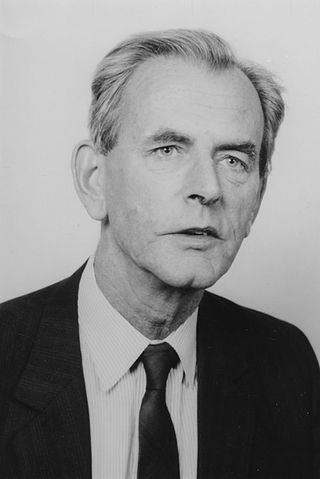Related Research Articles

Imperial College London (Imperial) is a public research university in London, England. Established by royal charter in 1907, the college was formed out of the Royal College of Science, the Royal School of Mines and the City and Guilds of London Institute. These colleges had developed out of Albertopolis, an area for culture and meseums envisioned by Prince Albert, consort of Queen Victoria, that included the Royal Albert Hall, the Victoria and Albert Museum, the Natural History Museum and royal colleges. In 1988, the Imperial College School of Medicine was formed as part of the college's Faculty of Medicine by merging with St Mary's Hospital Medical School. In 2004, Queen Elizabeth II opened the Imperial College Business School.

The Medical Research Council (MRC) is responsible for co-coordinating and funding medical research in the United Kingdom. It is part of United Kingdom Research and Innovation (UKRI), which came into operation 1 April 2018, and brings together the UK's seven research councils, Innovate UK and Research England. UK Research and Innovation is answerable to, although politically independent from, the Department for Business, Energy and Industrial Strategy.

Ara Warkes Darzi, Baron Darzi of Denham, is an Armenian-British surgeon, academic, and politician.

Sir Andrew Philip Witty is a British business executive, who is the chief executive officer (CEO) of UnitedHealth Group. He was the CEO of GlaxoSmithKline between 2008 and 2017. He formerly held the role of chancellor of the University of Nottingham.
Imperial College Healthcare NHS Trust is an NHS trust based in London, England. It is one of the largest NHS trusts in England and together with Imperial College London forms an academic health science centre.

The National Health Service (NHS) is the umbrella term for the publicly funded healthcare systems of the United Kingdom, comprising the NHS in England, NHS Scotland and NHS Wales. Health and Social Care in Northern Ireland was created separately and is often locally referred to as "the NHS". The original three systems were established in 1948 as part of major social reforms following the Second World War. The founding principles were that services should be comprehensive, universal and free at the point of delivery—a health service based on clinical need, not ability to pay. Each service provides a comprehensive range of health services, provided without charge for people ordinarily resident in the United Kingdom apart from dental treatment and optical care. In England, NHS patients have to pay prescription charges; some, such as those aged over 60, or those on certain state benefits, are exempt.
The National Institute for Health and Care Research (NIHR) is the British government's major funder of clinical, public health, social care and translational research. With a budget of over £1.2 billion in 2020–21, its mission is to "improve the health and wealth of the nation through research". The NIHR was established in 2006 under the government's Best Research for Best Health strategy, and is funded by the Department of Health and Social Care. As a research funder and research partner of the NHS, public health and social care, the NIHR complements the work of the Medical Research Council. NIHR focuses on translational research, clinical research and applied health and social care research.

Tim Kelsey is an English-Australian business executive. He is CEO of Beamtree,, an Australian healthcare company (ASX:BMT) based in Sydney, Australia. He started in the role in December 2020.

Dame Sally Claire Davies is a British physician. She was the Chief Medical Officer from 2010 to 2019 and Chief Scientific Adviser at the Department of Health from 2004 to 2016. She worked as a clinician specialising in the treatment of diseases of the blood and bone marrow. She is now Master of Trinity College, Cambridge, appointed on 8 February 2019, with effect from 8 October 2019. She is one of the founders of the National Institute for Health and Care Research.

The Health and Social Care Act 2012 is an act of the Parliament of the United Kingdom. It provided for the most extensive reorganisation of the structure of the National Health Service in England to date. It removed responsibility for the health of citizens from the Secretary of State for Health, which the post had carried since the inception of the NHS in 1948. It abolished primary care trusts (PCTs) and strategic health authorities (SHAs) and transferred between £60 billion and £80 billion of "commissioning", or healthcare funds, from the abolished PCTs to several hundred clinical commissioning groups, partly run by the general practitioners (GPs) in England. A new executive agency of the Department of Health, Public Health England, was established under the act on 1 April 2013.
The Hillingdon Hospitals NHS Foundation Trust is an NHS foundation trust responsible for the healthcare services provided at Hillingdon Hospital and Mount Vernon Hospital in the London Borough of Hillingdon.
Stephen Kevin Smith is a British academic and health executive who led the creation of the United Kingdom's first Academic Health Science Centre at Imperial College London.

Sir Mark Jeremy Walport is an English medical scientist and was the Government Chief Scientific Adviser in the United Kingdom from 2013 to 2017 and Chief Executive of UK Research and Innovation (UKRI) from 2017 to 2020. In 2023 he became the Foreign Secretary of The Royal Society.

Clive Peedell is an English politician and doctor specialising in oncology. He is a co-founder and former leader of the National Health Action Party. He stood as the candidate for Witney against Prime Minister David Cameron in the 2015 United Kingdom general election.

Brian Abel-Smith was a British economist and expert adviser and one of the most influential figures of the twentieth century in shaping health and social welfare. In Britain, his research for the Guillebaud committee in 1956 proved that the NHS provided extremely good value for money and deserved more investment. From the 1960s he was one of a new breed of special advisers to Labour government ministers – helping Richard Crossman, Barbara Castle and David Ennals to reconfigure the NHS, set up Resource Allocation Working Party, and the Black Inquiry into Health Inequalities. Internationally, he steered the development of health services in over 50 countries. He was a key WHO and EEC adviser, intimately involved in setting the agenda for global campaigns such as Health for All by the year 2000.

Simon Laurence Stevens, Baron Stevens of Birmingham is Chair of the UK Maritime and Coastguard Agency, Chair of Cancer Research UK, Chair-designate of King's College London, and an independent member of the House of Lords. Stevens previously served as the eighth Chief Executive of NHS England from 2014 to 2021. Earlier in his career he worked in the Prime Minister's Office at 10 Downing Street, as well as internationally, including Guyana, Malawi, and the United States. He was a visiting professor at the London School of Economics from 2004 to 2008.
Mahiben Maruthappu is a British physician, entrepreneur, academic researcher and health policy specialist. He co-founded Cera, a home healthcare company and one of the largest social care providers in the UK. He was the founder and first President of the United Kingdom Medical Students' Association (UKMSA). He co-founded the National Health Service (NHS) Innovation Accelerator (NIA), a program that accelerates the adoption of new healthcare technologies, and served as NHS England's Innovation Adviser. He has contributed to more than 60 research papers in peer-reviewed journals.
Sean Worth is a former political adviser and co-founder of the public relations firm WPI Strategy. Prior to setting up WPI Strategy, Worth was a Downing Street special adviser to Prime Minister David Cameron. He left Government in 2012 to set up the Better Public Services Project at the think tank Policy Exchange. Prior to working in Government, Worth was head of the Conservative Party's Policy Unit, and worked for the party through two general elections. The Guardian newspaper reported that, when leaving Downing Street, Worth was David Cameron's "special adviser on NHS privatisation" and began working for MHP Communications in October 2012.
Nicholas Piers Huxley Hillman is an English higher education policy adviser, previously a school history teacher and special adviser for the Conservatives. He has been the director of the Higher Education Policy Institute since 2014.
The Institute of Global Health Innovation is one of Imperial College London’s global challenge Institutes. Established in 2010, its mission is to improve global health and care through evidence-based innovation. The Institute’s work aims to support the identification, development and implementation of healthcare innovation, with the goal of sustainably reducing inequalities in global health.
References
- ↑ "Institute of Global Health Innovation". Imperial College London. Retrieved 4 March 2022.
- ↑ " @n_seddon " on Twitter
- ↑ "Institute of Global Health Innovation". Imperial College London. Retrieved 4 March 2022.
- ↑ Grose, Thomas (25 June 2018). "The Next Wave of Brain Research". AARP. Retrieved 4 March 2022.
- ↑ "Institute of Global Health Innovation". Imperial College London. Retrieved 4 March 2022.
- ↑ "HSJ100 2013 The annual list of the most influential people in health". Health Service Journal. 11 December 2013. Retrieved 14 December 2013.
- ↑ "Stephen Hawking: NHS is Britain's finest public service and must be preserved from commercial interests" . The Independent. 2 December 2013. Archived from the original on 2022-06-20. Retrieved 14 December 2013.
- ↑ Seddon, Nick (2007). Who Cares? (PDF). Author: Civitas. p. vii.
- ↑ "Institute of Global Health Innovation". Imperial College London. Retrieved 4 March 2022.